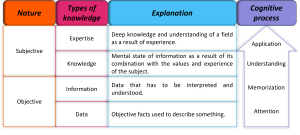3 Pedagogical foundations
Digital Technology (DT) has experienced a quick introduction into the educational process during the last years, providing us with great opportunities to widen learning and teaching possibilities and to respond to the necessities and challenges of nowadays society. However, we should not forget that technology always must be a means to an end, and not an end on its own. Therefore, the introduction of technology in the educational process has to be accompanied with a change in the methodology if we want to make a real innovation in our classroom (Esteve et al., 2018). That is why we need to state the pedagogical foundations that support the use of the technology in the educational process.
Different theoretical underpinnings may be used to support the use of virtual simulations in our educational plan. The actual choice will depend on the kind of virtual simulation being used, its purpose and the modality in which the simulation is applied.
One of the most common theories that support the use of VGS in higher education is the Experiential Learning theory of David Kolb. In his theory, Kolb tries to recreate the way in which informal learning happens in a formal or non-formal learning environment. This has led to some authors to consider that the Experiential Learning theory supposes a bridge between the informal and formal types of learning (Jackson & Maclsaac, 1994).
To explain how the experiential learning occurs, and how we should recreate this experience in the classroom, Kolb (1984) proposes the following cycle:
 More pedagogical foundations:
More pedagogical foundations:
The hierarchy of knowledge
Our main objective with the use of the VGS will be to develop a proper understanding of the information that the students have received during their lessons in the university, and the ability to transfer that knowledge to change their professional practices. Thus, what we want is that the students learn how to use the knowledge that they have in their minds through virtual scenarios and reach a proper degree of understanding that makes them capable of using it in real contexts when they face similar situations. Based on the knowledge hierarchy proposed by Bender and Fish (2000), summarized in Table 1, we would be talking about the intermediate steps between the information, knowledge and the expertise.
Table 1. Hierarchy of knowledge and associated cognitive processes

When it comes to the development of knowledge and expertise, they cannot be conveyed by the teachers to the learners as it happens with the information and data. Therefore, the learners on their own are responsible for creating their own knowledge and expertise by mixing the information they receive with their personal beliefs, values and experience in the case of knowledge; and by practising that knowledge over a long period of time in the case of the expertise (Bender & Fish, 2000). Instructional strategies that allow students to understand the information they are studying are needed, making a process of re-elaboration of their cognitive structures possible, and therefore a significant learning process (Ausubel et al., 1990). It is in this point where simulations in all its forms can play a key role by fostering practice and experience-based learning.
To ensure the presence of all the stages of the Experiential learning cycle in a VGS and to enable the formation of a significative learning process, it is needed that the planning of the virtual simulation activity includes three different phases that we will explain in more detail in the next sections:
- Prebriefing: This phase is crucial to activate the previous knowledge of the students, and work on the relevant data and information that the students will have to apply during the simulation.
- Enactment or simulation: This phase corresponds with the Concrete Experience of the Experiential learning theory, in which students will be immersed in a virtual situation that they have to solve.
- Debriefing: Many experts in the field consider the last phase as the most important in the simulation activity (Brown et al., 2021; Decker et al., 2013; Verkuyl et al., 2020; Zapalska et al., 2012; Zigmont et al., 2011). It corresponds to the Reflective Observation and Abstract Conceptualization stages of the Experiential Learning theory. It consists of a post-simulation activity that enables a deeper understanding of the situation and the formation of a refined knowledge through the reflection and discussion of the experience they had and the way in which they faced it.
Ideally, this process should continue with a new experience (real or virtual) that would correspond to the Active Experimentation stage of Kolb’s theory, providing the students with a new opportunity to further refine their knowledge in a new situation, and gain expertise in the field.


